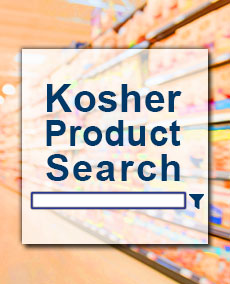Products containing any of the ingredients listed below should not be purchased unless the product is Rabinically approved.
Edible Fat, Edible Oil, Fish Oil
Should be avoided as one does not know the source from which they are derived.
Gelatine, Glycerine, Glycerides, Polysorbates, Stearates, Diacetin & Triacetin
May be animal derived and should be avoided.
Casein Milk protein solids.
The manufacturing process is akin to that of cheese and therefore casein is only kosher when made synthetically or under Rabbinical supervision.
Balsamic Vinegar, Wine Vinegar, Wine & Brandy
Many ingredients of wine origin render a product non-kosher unless the product is manufactured under Rabbinical supervision. Vinegar of unspecified source may be of wine origin.
Shortening
Shortenings are cooking fats and could contain animal fats.
Rennet
Rennet is used in cheese manufacture as a clotting agent. Rennet is a concentrated extract of the rennin enzyme obtained from either calves or adult cattle.
FOOD ADDITIVES
Most processed foods nowadays contain food additives, and they are referred to according to a standardized set of EU numbers - E numbers.
Certain E numbers may be derived from animal or vegetable sources. When present in kosher products E numbers will be of vegetable origin and approved by the London Beth Din.
Problematic E numbers
| E120 | E340i | E422 | E430 | E431 |
| E432 | E433 | E434 | E435 | E436 |
| E441 | E442 | E470 | E470a | E470b |
| E471 | E472a | E472b | E472c | E472d |
| E472e | E472f | E473 | E474 | E475 |
| E476 | E477 | E479b | E481 | E482 |
| E483 | E491 | E492 | E493 | E494 |
| E495 | E542 | E570 | E572 | E1441 |
E120, Cochineal, Carmine, Carminic Acid This is unique in that it is the only non-permitted colour. It is a naturally occurring red colour, which is derived from the cochineal beetle.
E422 Glycerol Glycerol occurs naturally in many plant cells and is synthesized by the plants themselves, but it is obtained commercially from oils and fats as a by-product of the soap and fatty-acid industry. It is used as a sweetener or to reduce the effects of humidity on food.
E432 - E495, E1441 Emulsifiers & Stabilisers These are derived commercially from fatty acids. Emulsifiers play an important role in the food industry because the manufacture of many foodstuffs involves the formation and stability of an emulsion (eg oil and water), and an emulsifier aids the mixing of these two liquids to form one complete product (eg mayonnaise). Stabilisers help to keep the product in a stable condition, preventing the breakdown of the emulsion.
E542 Edible Bone Phosphate Degreased steam extract of animal bones, used in medicines as an anti-caking agent to prevent particles sticking together.
E570 Stearic Acid Naturally occuring fatty acid found in all animal fats and vegetable oils, used as an anti-caking agent, eg in spices.
E572 Magnesium Stearate Prepared synthetically from commercial stearic acid and used as an anti-caking or release agent, eg in moulded confectionery.
A full list of additives can be obtained from the Food Standards Agency. Helpline number - 020 7276 8829, website www.food.gov.uk.




